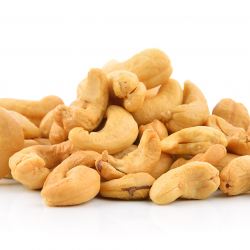You may not have been aware, but most tree nuts — think almonds and pecans for example — have been considered a desired ingredient in a balanced diet. Although they are high in fats, it's primarily the unsaturated sort that is not thought to help raise blood cholesterol levels. Not so for cashews, because about 1/3 of their fats are saturated, and thus have been frowned on by nutritionists (the FDA doesn't allow the same health claim for cashews as it does for other tree nuts). However, observing that one third of the saturated fat in cashews is a type called stearic acid, which is neutral with respect to cholesterol levels, a group of researchers set out to determine if, indeed cashew consumption doesn't raise cholesterol levels.
Senior author DeAnn J. Liska from Biofortis Inc., Addison, IL and colleagues reported on a randomized, crossover controlled-feeding trial that included 51 men and women, aged 21-73 years. Participants were randomly assigned to begin either a cashew-supplemented diet or a potato chip-supplemented diet for 28 days; then they resumed their normal diets for two weeks, and then switched to the other supplemented diet for 28 days. In each case, the cashews or potato chips provided 11 percent of the participants' total calories.
During the intervention periods, all foods and drinks were provided; if the people ate any foods not given to them they were to record them and bring any leftover foods with them to the clinic at their next appointment. Except for the supplements, the diets during the intervention phases were similar, typical American diets — 50-54 percent of calories from carbohydrates, 18 percent from protein, and 29-32 percent from fat.
Compared to their baseline levels, the cashew diets led to a significantly greater decrease in total cholesterol than the potato chip supplement -3.9 percent vs +0/8 percent. Similarly, LDL cholesterol decreased by 4.8 percent compared to a rise of 1.2 percent after the potato chip-supplemented diet.
Thus, the authors concluded "[T]he consumption of cashews as part of an average American diet by men and women with high LDL cholesterol or who are at risk of high LDL cholesterol results in decreases in total cholesterol, LDL cholesterol, and non-HDL cholesterol, consistent with the effects of other tree nuts." They also noted that, since cashews are the third-most popular tree nut in the US, their results could have wide-ranging implications.
While this was only a small study, it was well-designed and well-run. We cannot expect the FDA to change its ruling on the labeling of cashews based on this study alone, but the results certainly support further research to replicate and confirm these results.

